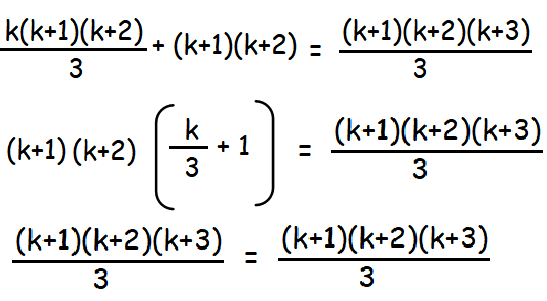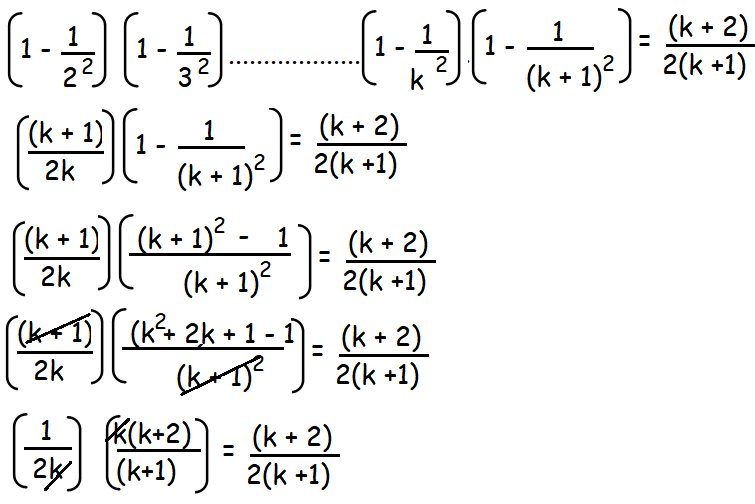PRINCIPLE OF MATHEMATICAL INDUCTION EXAMPLES
Subscribe to our ▶️ YouTube channel 🔴 for the latest videos, updates, and tips.
Question 1 :
By the principle of mathematical induction, prove that, for n ≥ 1
1.2 + 2.3 + 3.4 + · · · + n.(n + 1) = n(n + 1)(n + 2)/3
Solution :
Let p(n) = 1.2 + 2.3 + 3.4 + · · · + n.(n + 1) = n(n + 1)(n + 2)/3
Step 1 :
put n = 1
p(1) = 1.2 + 2.3 + 3.4 + · · · + 1.(1 + 1) = 1(1 + 1)(1 + 2)/3
1 = 1
Hence p(1) is true.
Step 2 :
Let us assume that the statement is true for n = k
p(k) = 1.2 + 2.3 + · · · + k.(k + 1) = k(k + 1)(k + 2)/3 ----(1)
We need to show that P(k + 1) is true. Consider,
Step 3 :
Let us assume that the statement is true for n = k + 1
p(k+1)
1.2 + 2.3 + · · · k(k + 1) + (k+1).(k + 2) = (k+1)(k+2)(k+3)/3
By applying (1) in this step, we get

Hence, by the principle of mathematical induction for n ≥ 1
1.2 + 2.3 + 3.4 + · · · + n.(n + 1) = n(n + 1)(n + 2)/3
Question 2 :
Using the Mathematical induction, show that for any natural number n ≥ 2,
(1 − 1/22) (1 − 1/32)(1 − 1/42) ...............(1 − 1/n2) =(n + 1)/2n
Solution :
Let p(n) = (1 − 1/22) (1 − 1/32)(1 − 1/42) ...............(1 − 1/n2)
Step 1 :
(1 − 1/22) (1 − 1/32)(1 − 1/42) ...............(1 − 1/n2) =(n + 1)/2n
put n = 2
p(2) = (3/4) = 3/4
Hence p(2) is true.
Step 2 :
Let us assume that the statement is true for n = k
(1 − 1/22) (1 − 1/32) ..................(1 − 1/k2) =(k + 1)/2k --(1)
We need to show that P(k + 1) is true. Consider,
Step 3 :
Let us assume that the statement is true for n = k + 1
p(k+1)
(1 − 1/22) (1 − 1/32) ................(1 − 1/k2) + (1 − 1/(k+1)2)
= (k + 2)/2(k + 1)
By applying (1) in this step, we get

(k + 2)/2(k + 1) = (k + 2)/2(k + 1)
Hence, by the principle of mathematical induction natural number n ≥ 2,
(1 − 1/22) (1 − 1/32)(1 − 1/42) ...............(1 − 1/n2) =(n + 1)/2n
Subscribe to our ▶️ YouTube channel 🔴 for the latest videos, updates, and tips.
Kindly mail your feedback to v4formath@gmail.com
We always appreciate your feedback.
About Us | Contact Us | Privacy Policy
©All rights reserved. onlinemath4all.com

Recent Articles
-
Digital SAT Math Problems and Solutions (Part - 2)
Feb 19, 26 07:14 PM
Digital SAT Math Problems and Solutions (Part - 2) -
Tricky SAT Math Problems Solved Easily
Feb 19, 26 09:11 AM
Tricky SAT Math Problems Solved Easily -
Digital SAT Math Problems and Solutions (Part - 1)
Feb 18, 26 03:01 AM
Digital SAT Math Problems and Solutions (Part - 1)


